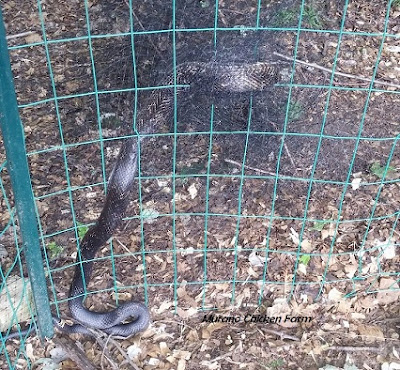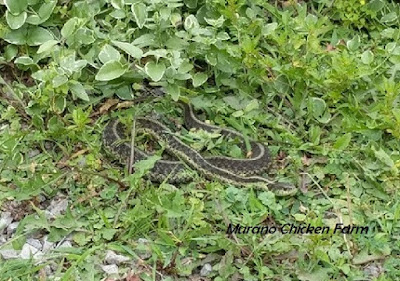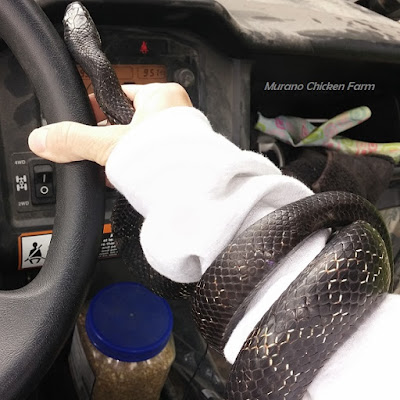They couldn't be more wrong.
Over the years I have lost 2 grown hens, a few chicks, and some eggs to snakes. Unfortunately since I live in the woods, I have more snake encounters than the average chicken keeper...but that also means I have more opportunity to test out snake repellent methods.
A snake will kill a full grown chicken even when it's glaringly obvious that it could never swallow a chicken that size. Many chicken keepers have found a deceased chicken with a wet looking head and neck. That happens when a snake kills then tries to eat something that is too big. It gives up and spits it back out.
In my situations both of the hens that the snake killed had chicks with her. I found both with the snake still wrapped around the hen and it's my theory that she was trying to keep the snake from the chicks. She may have even pecked at it to try to make it leave.
The snake couldn't get past the mama hen so it decided to kill her first. I don't think the snake would have even attempted to swallow the hen, but we'll never know.
Keeping snakes out of the chicken coop
The main way to protect chickens from snakes is to make sure the snakes can't get to the chickens. Obviously your number one line of defense against snakes is to keep them out of the chicken coop in the first place. It's tricky, but possible.
Predator proof your coop
You'll want to look for any holes that the snake can fit through. Typically anything 1/2" or more should be filled in or covered securely. Check around doors, windows and the roof for holes. Make sure areas left open for air circulation are covered with hardware cloth.
Keep in mind that if you leave your doors wide open during the day (most of us do) a snake can easily get in that way. That is exactly what happened to my d'Uccle hen.
If your coop has a run, hardware cloth should be used on the run instead of chicken wire. Many snakes can easily get through the holes in chicken wire, though they will probably get stuck inside after eating. You'll also want to put a roof on your run as snakes can climb and fencing makes that pretty easy for them.
If you use a fencing with spaces larger than 1/2" on your run, you might want to fasten bird netting to it. I do this on my grow out pen. If a snake tries to get through the netting it may fit at first, but as it moves through the holes it will eventually get to where it's body is too wide to get through the small holes of the netting.
The netting is really difficult for them to back out of though. You will inevitably have to untangle a snake from the fence and netting (I just cut the netting to remove the snake and zip tie it back together) but at least the snake didn't get your chicks!
Keep mice and rats out of the chicken coop. Snakes eat rodents and having them around your chicken coop is a big attractant for snakes. Follow my 3 Simple Steps to Keep Your Coop Rodent Free to keep mice, rats and even chipmunks out of your chicken coop.
Clear debris, equipment and weeds away from the perimeter of the chicken coop and run. Don't leave anywhere for snakes to hide. Keep grass trimmed low. Consider planting lemongrass and marigolds near the coop as they're known to repel snakes.
Guinea fowl are good to keep with your chickens as they will alert for any predator, but they especially hate snakes. The snake in the above picture was in the yard and I came outside to see what was going on because the guineas were yelling at it. As soon as I got near it the snake slithered between the rocks next to the steps.
I immediately started recording the video below and and even after the snake had hidden to where they couldn't get it, the guineas keep coming back to yell at it some more! lol (I was holding my phone the wrong way, sorry!)
Use snake deterrents and traps
Snake deterrent powder can be sprinkled on the ground outside of the coop and run. I used an all natural one called Snake Shield and it: elicits a neurological reaction in snakes that effectively repels them with just one encounter. Snakes rely on a special organ, called the Jacobsen’s organ, to interpret environmental stimuli and navigate their surroundings. Snake Shield temporarily blocks this critical function, causing snakes to immediately retreat in search of fresh air.
Snake traps are a thing and they work pretty well. I didn't know this till I started looking around, but there are different styles available depending on what type and size snakes you're dealing with. I highly recommend the humane snake traps and not the glue trap type.
A friend of mine swears by keeping a Minnow trap with an egg in it inside the coop at all times. The snake gets in the trap through the small hole and drops down to where the egg is. After eating the egg it cannot get back out. He swears it works. If you are going to use some type of trap, make sure you check it daily.
Once trapped I usually take snakes for a drive to the back of my woods and let them go about 10 acres from where they were caught. I don't know how far they can actually travel, but that distance seems to work for me.
Snake deterrents that don't work
Golf balls. I've often heard that if you put golf balls or ceramic eggs in the nest boxes that snakes will eat them, be unable to digest them and die. There are 2 major flaws in this theory. First, snakes have an amazing sense of smell and generally they will not be confused by a non egg item.
Second, snakes can regurgitate quite easily. In fact, after eating an egg they regurgitate the undigested eggshell. They will have no problem spitting that golf ball right back up once they realize it's not food. Good in theory, but chances are you'll just be out a golf ball.
Now there is a small chance that a snake will get confused and eat that fake egg or golf ball (more likely: real eggs or a chick) then not be able to fit back out through whatever tiny hole he got in through. In that case, the snake would be stuck in the coop and you would be able to relocate him far away.
You're going to have to catch the snake before a chicken sees it and starts a fight with it though...which is a risky chance to take.
I have heard that snakes hate the smell of mothballs and will stay away from them. However, mothballs are toxic and contain a chemical known to cause cancer.
Plus, you wouldn't want your chickens to get into them accidentally and get sick. Mothballs are a pesticide regulated by the EPA and using them outdoors and in this manner is actually illegal.
In closing, if you have a snake problem there are a lot of effective methods to control it.
Whatever you do, please do not attempt to pick up a snake unless you have positively identified it as non venomous and have taken the proper precautions. Wear thick gloves if you are not used to handling snakes. (I used to raise pythons) If you are not comfortable touching a snake, a big box and a shovel can help you get it out of your way.
Please be careful! I would hate for anybody to get bitten!
Having problems with other predators around your coop? Click here for my previous posts on chicken predators!
~L
Want information on raising chickens sent right to your email weekly? Click right here to join my list and get new posts sent directly to you the day they're published ... plus, you'll also get the free download '25 Ways to save money raising chickens'.
This post contains affiliate links. If you chose to purchase something through the link, I will get a small payment from Amazon. It will not affect your purchase price. Click for full disclosure.






Great article. Thanks.
ReplyDeleteI'm glad that you like it!
DeleteThanks for stopping by!
Lisa
Some good ideas Thankyou. I'm in Australia and a common snake is a carpet python, can get reasonably large and very strong, relocating is not a favourite option. Perhaps the repellant , I will have the investigate that as I didn't even know such a thing existed.
ReplyDeleteThanks again. MARK
I had to look up that snake as I had never heard of it. It sure is pretty but I would not want that snake by my chicken coop! Good luck getting rid of those!
DeleteLisa
yes we lost all our gouldian finches this week 2 caret pythons i couldn't even find how they got into cage
DeleteAwwww, I'm so sorry to hear about your goldfinches! Snakes can squeeze into impossibly small spaces. It's really hard to block them out.
DeleteLisa
Last week, we had our first encounter with a snake in our coops in 3 years! We went to collect eggs. When my wife checked the 2nd nest box, she slammed the lid down and called me over. When she told me there was a snake in the nest box, I assumed it was a chicken snake and raised the lid to check. Nope, first thing I saw was a triangular shaped head and I knew it was poisonous! I grabbed my 22 pistol and dispatched it wit 2 shots. It was almost 5' long and was a water moccasin! I had trimmed around the coops the day before and might have pushed it out of the bushes. Needless to say, we are carefully looking when we open the nest boxes now! I am going to put down some snake repellant as soon as I get to the store! We live in the country on one of the largest man made lakes in the USA, Toledo Bend Reservoir!
ReplyDeleteOh wow that had to be scary....I probably would have had a heart attack! Great job at taking care of the problem. Luckily we don't have water moccasins here, ours are usually just harless black snakes. Stay safe out there!
DeleteLisa
I don't know about others, but the most common snakes (aside from rattlers) near me, gopher snakes patrol a quarter square mile as their home territory, and a snake site read that was small. Thank you for this blog! I recently subscribed and it's very useful.
ReplyDeleteThankfully, we don't get rattlers around here...I would be scared to death! I'm glad you like the blog! Thanks for subscribing!
DeleteLisa
In middle North Carolina, most of our snakes are harmless, but we do have the copperhead that is poisonous. This is our first attempt at raising chickens. The kids are all excited to help. I definitely want to do all I can to minimize any snake encounters. Thanks for the tips.
ReplyDeleteI just located this article and enjoyed the information you shared. I just wanted to add a possible deterrent for Snakes and Bears. I live in an area where my property is surrounded on 3 sides by government land. To say the least I have been living in the Boonies for the past 20+ years with Bear and snake along with every other critter as a normal part of my daily life. I recently had issues with both of the above name pains and had to seek some professional knowledge. After speaking with a friend that works government game I was told that I could spray plain Pine-Sol around the area and it would repel both of these critters. This is the first year I have tried it but I will tell you that I have not encountered either this year and it is the first year in a very long time. I spray the plain Pine-Sol around my home, usually around the base sometimes on the sides of the outer walls. At the base for snakes and on the sides for bears to be able to smell real well. I also spray around my coop but please be careful not to get any of it on the inside. Keep the spray away from your chicken's food and water, which is a must! It also has to be the plain so make sure it is not scented with lemon or anything else because a fruity smell could attract the bear to come closer. I was told that bear can smell up to 15-18 miles but I'm not sure about snakes. Since I started doing this I have not had any snakes of any kind nor any bear. Even my distant neighbors haven't had any bear at their homes which has been great. I'm not sure if it will work for you but it has for me, so I wanted to share this information with anyone it could possibly help. Thank you for all of your wonderful tips. I will be adding your knowledge to my noggin. You are greatly appreciated!
ReplyDelete